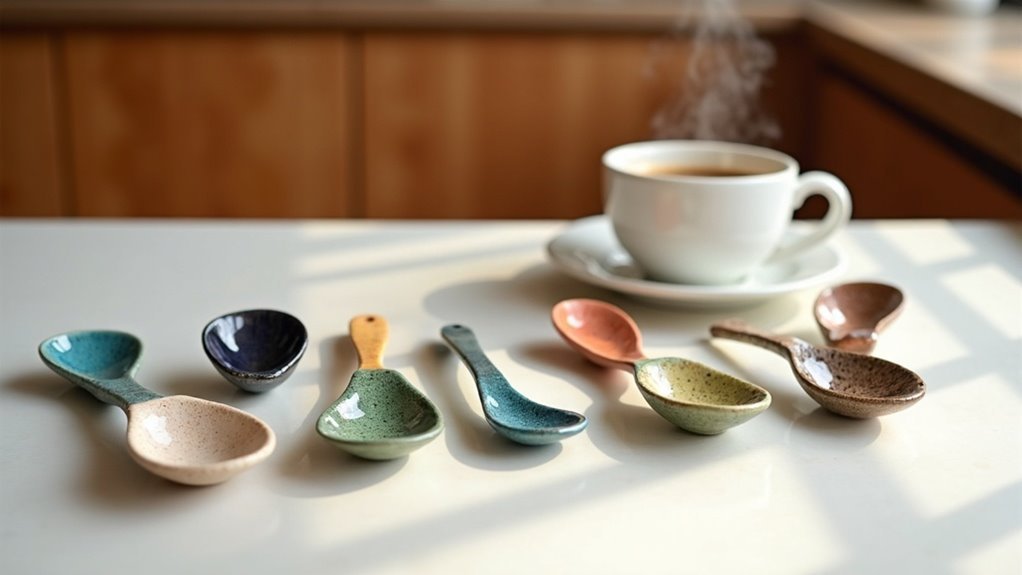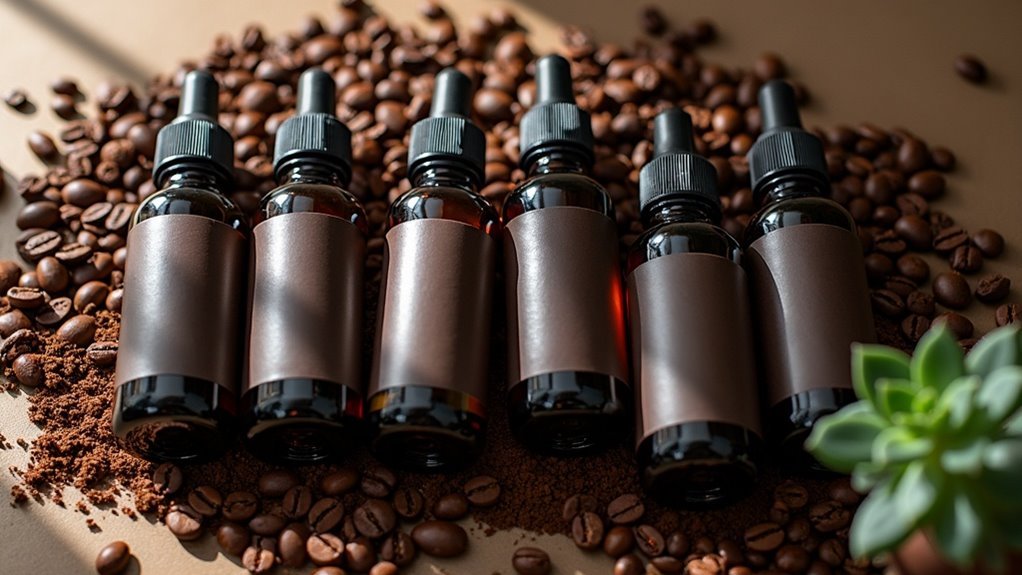Yes, coffee can interact with birth control. Hormonal birth control can increase your sensitivity to caffeine, leading to heightened effects like anxiety and jitteriness. This occurs because hormonal contraceptives may slow liver enzyme activity, which affects how caffeine is metabolized. It’s advisable to limit your caffeine intake to about 300 mg daily to manage these effects. Staying hydrated and considering lower-caffeine alternatives can be beneficial. Additionally, you can explore more about caffeine’s impact on menstrual symptoms and effective management strategies related to coffee consumption.
Key Takeaways
- Hormonal birth control can increase caffeine sensitivity, leading to heightened effects such as anxiety and jitteriness.
- Users of birth control may experience prolonged caffeine effects due to slower liver enzyme activity.
- For those on birth control, the recommended daily caffeine limit is approximately 300 mg, which is about 3 cups of coffee.
- Certain foods, like grapefruit, can negatively interact with caffeine metabolism, potentially affecting its effects.
- It’s essential to consult healthcare providers about coffee intake to manage side effects and promote overall well-being.
Understanding Caffeine Sensitivity in Women on Birth Control
When you’re on hormonal birth control, you might notice that your sensitivity to coffee increases.
This heightened sensitivity occurs because hormonal changes can slow down the liver enzymes that metabolize caffeine found in coffee. As a result, caffeine from coffee lingers in your system longer, intensifying its stimulant effects.
You may experience elevated heart rates, increased anxiety, or sleep disturbances, especially during menstruation when discomfort is already heightened.
Individual responses to coffee can vary greatly, influenced by genetics and sleep patterns.
To mitigate adverse effects, it’s wise to monitor and potentially reduce your coffee intake and consult your healthcare provider for personalized advice.
How Birth Control Affects Caffeine Metabolism
Hormonal birth control significantly influences how your body processes coffee, leading to some unexpected outcomes. It can slow down coffee metabolism by affecting liver enzyme activity, causing caffeine from your favorite brew to linger longer in your system. As a result, you might experience increased sensitivity, with heightened side effects like jitteriness and anxiety after that morning cup. Individual responses can vary based on genetics and lifestyle, so regular coffee consumption may amplify these effects over time.
| Effect | Description |
|---|---|
| Slower Clearance | Coffee remains active longer |
| Increased Sensitivity | Heightened side effects reported |
| Variable Responses | Affected by genetics and lifestyle |
| Prolonged Effects | Coffee impacts last longer |
| Adaptation Over Time | Possible increased stimulant effects |
The Impact of Caffeine on Menstrual Symptoms
Caffeine, particularly from coffee, can significantly influence your menstrual symptoms, often heightening feelings of anxiety and insomnia that many experience during this time.
High coffee consumption can worsen discomfort, leading to digestive issues and dehydration, which are especially important to consider if you’re on birth control pills.
While a moderate amount of coffee might help alleviate menstrual-related headaches, excessive intake can instead provoke tension headaches.
It’s crucial to monitor your coffee intake, as individual responses can vary widely.
Recommended Caffeine Intake for Birth Control Users
If you’re using birth control and enjoy coffee, it’s important to be mindful of your caffeine intake due to potential increased sensitivity.
Experts recommend limiting your daily caffeine to around 300 mg, which typically translates to about 3 cups of brewed coffee, to reduce the risk of side effects like jitteriness or anxiety.
Staying hydrated and exploring lower-caffeine coffee alternatives, such as decaf or cold brew, can also help you enjoy your coffee while managing these effects effectively.
Caffeine Sensitivity Variability
Many coffee enthusiasts find that their sensitivity to caffeine changes when they’re using birth control. Hormonal changes can slow caffeine metabolism, which may result in stronger and longer-lasting effects from your favorite brews.
This increased caffeine sensitivity might intensify side effects like jitteriness, anxiety, and sleep disturbances. To manage these effects, it’s wise to monitor your coffee intake and consider reducing it if you notice heightened sensitivity.
Staying hydrated can also help alleviate some negative reactions, especially when enjoying a cup of coffee. For personalized advice on coffee consumption while using hormonal contraception, consult your healthcare provider.
Understanding your body’s response to caffeine is key to minimizing side effects and maintaining overall well-being while savoring your daily coffee.
Recommended Daily Limits
Understanding how caffeine affects you while using birth control is important for managing your overall well-being.
Women on hormonal birth control, especially those taking estrogen-containing pills, may experience increased caffeine sensitivity. The recommended daily limit for caffeine is up to 400 mg, which is roughly equivalent to about four 8-ounce cups of coffee.
However, it’s wise to moderate your intake of coffee to avoid heightened side effects like anxiety and jitteriness. If you find coffee affecting you negatively, consider staying hydrated and exploring lower-caffeine alternatives or decaffeinated options.
Always consult with your healthcare provider for personalized advice on caffeine use while on birth control for ideal health management.
Hydration and Alternative Options
While managing your caffeine intake, especially if you enjoy coffee, it’s essential to stay hydrated and consider alternative options that complement your coffee drinking habits. Caffeine can lead to dehydration, particularly during menstruation, so here are some alternatives to keep you refreshed:
| Alternative Options | Benefits |
|---|---|
| Herbal Teas | Caffeine-free, soothing |
| Coconut Water | Electrolyte-rich hydration |
| Sparkling Water | Revitalizing, no caffeine |
If you’re a coffee lover, moderate your intake to about one cup daily, but always listen to your body. Consult your healthcare provider for personalized advice on hydration and caffeine consumption while considering your overall wellness.
Foods and Supplements to Avoid With Birth Control
If you’re a coffee lover, it’s important to be aware of certain factors that could influence your coffee experience.
Grapefruit can slow down liver enzymes that break down caffeine, possibly leading to increased side effects like jitteriness and anxiety.
St. John’s wort may interact with caffeine, so it’s best to avoid it if you’re sensitive.
Activated charcoal can also hinder caffeine absorption, making it inadvisable to mix with your brew.
While soy products contain phytoestrogens, excessive amounts may affect your body’s response to caffeine.
Lastly, fenugreek supplements can pose risks as well, but using fenugreek in food is generally safe.
Stay informed to enjoy your coffee without unwanted side effects!
Managing Side Effects Related to Caffeine and Birth Control
If you’re on hormonal birth control, you might notice that your sensitivity to caffeine, particularly from coffee, has increased.
This change can lead to heightened side effects, like anxiety and sleep issues, especially during your menstrual cycle.
Managing your coffee intake and exploring alternatives can help you find a balance that works for you.
Caffeine Sensitivity Variability
As hormonal changes from birth control can affect how your body processes caffeine, you might find yourself more sensitive to coffee’s effects. This increased sensitivity may lead to prolonged effects and intensified side effects, such as jitteriness and anxiety after that cup of joe.
Individual responses vary widely, shaped by genetics and sleep patterns. If you’re on the birth control pill, it’s wise to monitor your coffee intake, especially during menstruation when side effects can worsen.
Staying hydrated and opting for lower-caffeine coffee alternatives can help manage these sensitivities. By being mindful, you can alleviate some negative effects associated with coffee consumption while using hormonal contraception.
Hormonal Effects on Metabolism
Hormonal birth control can considerably influence how your body metabolizes coffee, which may lead to unexpected side effects.
When you’re on birth control, hormonal changes can slow down the metabolism of caffeine found in coffee within your liver, increasing your sensitivity to its effects. This can result in intensified side effects like jitteriness, anxiety, elevated heart rate, and sleep disturbances.
To manage these effects, it’s wise to monitor your coffee intake and consider reducing consumption. Staying well-hydrated can also help alleviate some negative symptoms.
Managing Intake and Alternatives
Managing your caffeine intake while enjoying coffee is essential, especially for those on birth control, to minimize side effects. Women on hormonal birth control often experience heightened caffeine sensitivity, which can lead to anxiety and jitteriness.
To manage your coffee consumption effectively, consider reducing your intake to alleviate issues like elevated heart rate and sleep disturbances. Instead of high-caffeine coffee blends, you might explore lower-caffeine options or herbal teas, especially during menstruation when caffeine may worsen symptoms.
Staying hydrated can also help counteract some negative effects. For personalized advice, consult your healthcare provider about managing your coffee consumption while on birth control to ensure your overall well-being.








